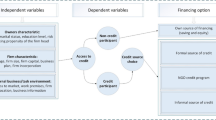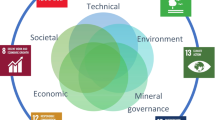Abstract
This paper is based upon a review of studies of mining companies, most of them being Canadian, in Chile, northern Canada, Tanzania, Guatemala, Ghana, Sierra Leone and the Democratic Republic of Congo. In spite of often well-meaning efforts, the wealth produced by most mining firms in developing areas largely benefits those immediately involved, sometimes neighbouring communities, and often those in the governing strata. Typically, mining takes place in enclaves and fosters enclave development rather than the kind of inclusive wealth development favoured by the UN’s recently published Inclusive Wealth Report. One way mining operations can foster more inclusive wealth development is to adopt much broader approaches towards the construction of the various physical and social infrastructures required for their own operations. By collaborating with diverse regional, provincial and/or national agencies and businesses, these infrastructures—roads, water, electricity, health services, schools and security—may be developed to serve larger populations and areas beyond their immediate operating sites. Established mining firms can also foster more inclusive wealth development by establishing more formal, collaborative relationships with artisanal miners.
Similar content being viewed by others
References
Acemoglu, D., & Robinson, J. A. (2012). Why nations fail: The origins of power, prosperity, and poverty. New York: Crown Publishers.
Ali, S. H. (2009). Treasures of the earth: need, greed, and a sustainable future. New Haven: Yale University Press.
Andersom, D. R. (2005). Corporate survival: the critical importance of sustainability risk management. New York: iUniverse Inc.
Auty, R. M. (1993). Sustaining development in mineral economies: the resource curse thesis. London, UK: Routledge.
Baker, R. W. (2005). Capitalism’s Achilles heel: dirty money and how to renew the free-market system. Hoboken: John Wiley and Sons.
Bird, F. (2004). Wealth and poverty in the Niger Delta: a study of the experiences of Shell in Nigeria. In F. Bird & S. W. Herman (Eds.), International business and the challenges of poverty in the developing world (pp. 34–63). Houndsmill: Palgrave Macmillan.
Bird, F. (2005). Preparing to mine: the Rio Tinto venture in Madagascar. In F. Bird, E. Raufflet, & J. Smucker (Eds.), International business and the dilemmas of development (pp. 114–131). Houndsmill: Palgrave Macmillan.
Bird, F. (2009). Project Care: placer Dome’s efforts to help laid-off South African miners find remunerative work. Journal of Business Ethics, 89, 183–190.
Bird, F., & Nixon, R. (2004). The Raglan mine and Nunavut Inuit. In F. Bird & S. W. Herman (Eds.), International business and the challenges of poverty in the developing world (pp. 206–223). Houndsmill: Palgrave Macmillan.
Curtis, M., & Lissu, T. (2008). A golden opportunity?: How Tanzania is failing to benefit from gold mining. Dar es Salaam: The Christian Council of Tanzania, The National Council of Muslims in Tanzania, The Tanzanian Episcopal Council.
Dashwood, H. S. (2012). The rise of global corporate social responsibility: Mining and the spread of global norms. Cambridge: Cambridge University Press.
Davidson, J. (1993). The transformation and successful development of small-scale mining enterprises in developing countries. Natural Resource Forum, 17, 315–326.
Davidson, J. (1998). Venezuela: building partnerships with artisanal miners. Mining Environmental Management, 6(2), 20–23.
Davidson, J. (2004). Mining together: a toolkit for engagement between large-scale and artisanal and small-scale mining. Unpublished Paper.
Drohan, M. (2003). Making a killing: how and why corporations use armed force to do business. Toronto: Random House.
Evans, P. (1997). State structures, government-business relations, and economic transformation. In S. Maxfield & B. Ross Schneider (Eds.), Business and the state in developing countries (pp. 63–87). Ithaca: Cornell University Press.
Ferguson, N. (2008). The ascent of money: a financial history of the world. New York: The Penguin Press.
Finn, D. K. (2006). The moral ecology of markets: assessing claims about markets and justice. Cambridge: Cambridge University Press.
Fossgard-Moser, T., & Bird, F. (2005). Managing security problems through community relations: a comparative study of petroleum companies in Columbia. In F. Bird, E. Raufflet, & J. Smucker (Eds.), International business and the dilemmas of development (pp. 255–265). Houndsmill: Palgrave Macmillan.
Fukuyama, F. (1995). Trust: the social virtues and the creation of prosperity. New York: The Free Press.
Garvin, T. M., Smoyer-Tomic, T. K., & Aubuynn, E. A. (2009). Community relations in gold mining in Ghana. Journal of Environmental Management, 90, 571–586.
Goldstuck, A., & Hughes, T. (2010). Securing a social license to operate: From stone age to new age mining in Tanzania. Research report, South African Institute of International Affairs.
Grote, M. (2007). Taxation for natural resources. Presented at the Expert Group Meeting on Tax Aspects of Domestic Resource Mobilization, UN Financing for Development Office & IFAD, Rome. Available on line at: http://www.un.org/esa/ffd/tax/2007DRM_SEG/.
Handley, A. (2008). Business and the state in Africa: Economic policy-making in the neo-liberal era. Cambridge: Cambridge University Press.
Humphreys, M., Sachs, J. D., & Stiglitz, J. E. (Eds.). (2007). Escaping the resource curse. New York: Columbia University Press.
Inclusive wealth report: Measuring progress toward sustainability. (2012). A project sponsored by the United Nations University, The International Human Dimension Program on Global Environmental Change, and the United Nations Environmental Program. Cambridge: Cambridge University Press.
Karl, T. (2007). Ensuring fairness: the case for a transparent fiscal social contract. In M. Humphreys, J. Sachs, & J. Stiglitz (Eds.), Escaping the resource curse (pp. 256–285). New York: Columbia University Press.
Nielsen, A. (2008). Anvil mining and the Democratic Republic of the Congo: Mining in a conflict zone. Major research paper, Department of Political Science, University of Waterloo.
North, D., Wallis, J. J., & Weingast, B. R. (2009). Violence and social order: a conceptual framework for interpreting recorded human history. Cambridge: Cambridge University Press.
Nussbaum, M. (1999). Women and human development: The capabilities approach. Cambridge: Cambridge University Press.
Putnam, R. D. (1993). Making democracy work: civic traditions in modern Italy. Princeton: Princeton University Press.
Riesco, M. (2004). Pay your taxes! Corporate social responsibility and the mining industry in Chile. (Draft Report). Santiago: Prepared for the United Nations Research Institute.
Roden, J. V. (2010). Mining and conflict in Central America: Firm power, community opposition, and the failure of firm-community engagement. Master’s Research Paper, Department of Political Science, University of Waterloo.
Ross, M. (2007). How mineral rich states can reduce inequality. In M. Humphreys, J. Sachs, & J. Stiglitz (Eds.), Escaping the resource curse (pp. 237–255). New York: Columbia University Press.
Sen, A. (1999). Development as freedom. New York: Random House.
Stiglitz, J. (2007). What is the role of the state? In M. Humphreys, J. Sachs, & J. Stiglitz (Eds.), Escaping the resource curse (pp. 23–52). New York: Columbia University Press.
Stiglitz, J. E., Sen, A., & Fitoussi J. (2010). Mis-measuring our lives: Why GDP doesn’t add up. The Report by the Commission on the Measurement of Economic Performance and Social Progress. New York: The New Press.
Weber, M. (1958). The protestant ethic and the spirit of capitalism. (Parson, T. trans.). New York: Charles Scribner’s Sons.
Weber, M. (1961). General economic history (Knight, F. H. trans.). New York: Colliers.
Whiteman, G. (2004). Forestry, gold mining, and Amerindians: The troubling example of Samling in Guyana. In F. Bird & S. W. Herman (Eds.), International business and the challenges of poverty in the developing world (pp. 181–205). Houndsmill: Palgrave Macmillan.
Author information
Authors and Affiliations
Corresponding author
Rights and permissions
About this article
Cite this article
Bird, F. The Practice of Mining and Inclusive Wealth Development in Developing Countries. J Bus Ethics 135, 631–643 (2016). https://doi.org/10.1007/s10551-014-2378-2
Published:
Issue Date:
DOI: https://doi.org/10.1007/s10551-014-2378-2




